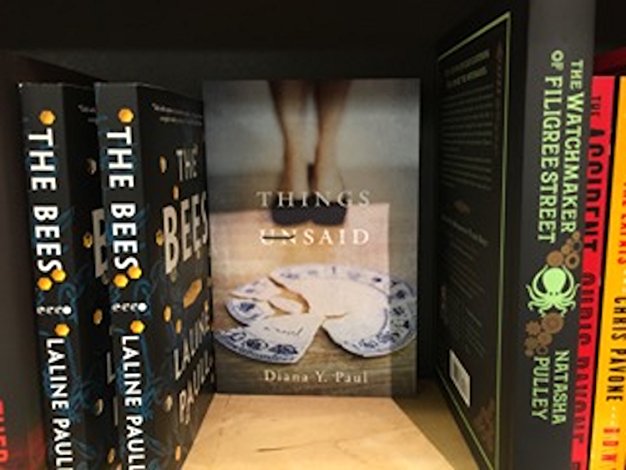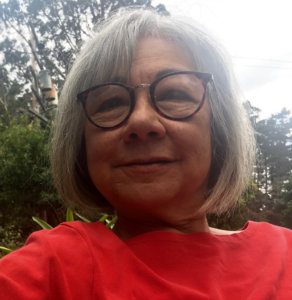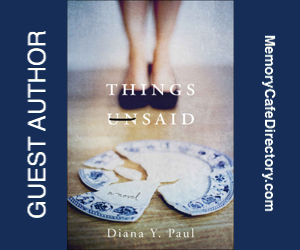Memory Cafe Directory posts and/or links to retailers can be advertising, sponsored, or affiliate links. We may earn a small commission from them. Thank you.
Links to Amazon and other retailers on this page are affiliate links. When you click through and make a purchase, Memory Cafe Directory earns a small commission from the retailer. Thank you.
Things Unsaid
By Diana Y. Paul
Heads Up!
Get ready for a long relationship between you and your aging parents. Parents are expected to take care of their children, but most parents never intend to become a burden on them. Yet illness or infirmity may make it impossible to continue to care for themselves.
Often one sibling does a disproportionate share of the caregiving duties, accompanied by resentment. At times adult children have different feelings towards the aging parent, which complicates sibling interactions even more. Family feuds, incompatible personalities, or judgmental attitudes toward siblings’ life-choices exist in most families. But when caregiving duties arise, the stress increases and highlights old family wounds.
Sibling conflict can even break up a family.
Conversations Eventually Turn to Family
When I was part of an informal women artists’ group, we’d meet over dinner and wine to talk about anything and everything. But inevitably, the topic would turn to family, dealing with siblings, and projected or ongoing caregiving for aging parents.
We would share experiences some of us already had with taking care of an increasingly frail mother or father. Some of my friends felt it was an honor to care for their mothers (or less frequently, fathers who outlived their spouses) and exhausted as they were, they wanted to “pay back” for the parental love and attention. Other women felt a reluctance to share conflicted emotions regarding caregiving for a parent who they had not been particularly close to.
The Book’s Beginnings
For over a year, I recorded notes and thoughts about the friends who wished they could be loving caregivers, but just couldn’t. They seemed almost in awe of the selfless, but fatiguing and demanding care that others willingly—although sometimes begrudgingly–provided on a daily basis.
The contrasts were stark between those who felt their parents were their best friends and those who felt otherwise. My friends and I discussed how the family dynamics of one’s childhood impacted the caretaking of a family member.
Everyone agreed that caring for one’s parents is much more difficult than caring for one’s kids, no matter how close the relationship. Moreover, memories of one’s childhood, in part, shaped how each of us felt about caregiving.
A Revelation
Until I had my women artists’ group, meeting weekly for over two years, I had never actually put together the reasons adult children care for their parents in radically different ways. I realized fairly quickly that the stronger the affection and bonds with the parent, the lower the burden as a caregiver.
“The stronger the affection and bonds with the parent, the lower the burden as a caregiver.”
Regardless, caregiving takes its toll.
One common sentiment from friends who remembered painful interactions with a parent goes something like this:
“I know what I have to do. We were never really close, but you have to do what you have to do.”
Some caregiving took place, regardless of the affection – or lack of it – often driven by guilt.
Un-Said and Un-Done
The most difficult conversations were those in which the parent-child relationship had been painful or unsupportive. In those instances some of my friends confessed to a feeling of relief once the parent’s death had occurred. This was especially true as the relationship ended with no qualitative difference in bonding – no “making things right.”
How do you address caregiving for an uncaring mother?
The practical nature of cleaning, grocery shopping, visiting – are acts that seem to provide some emotional comfort and safety. This felt true particularly when there was minimal affection exchanged and less emotional energy invested.
One friend admitted that she had hoped for a reconciliation – a reconnection to the maternal love she had wanted her whole life. She promised herself that she would give quality care to her mother until the very last breath.
As this friend confided in me, “My mother didn’t know who I was.” But one day she told me, “You remind me of my daughter. But she is young and beautiful while you are old and ugly.” Although this is not what she wanted to hear, she hung in there, despite long-remembered grievances. She intended to ignore the unhealthy dynamic of an earlier time.

Things Unsaid in the Carmel Free Library
A Novel Approach
So, I decided to write a novel, Things Unsaid, about the ties that bind, even when the adult child has moved on to create a family life of her own. My friends’ family stories became the soft tissue of my fictional family with real-world problems.
I wanted my readers to know that others have the same feelings – that they are not alone. I wanted to show the contrast between those tethered to the family to which they were born versus those who break the ties that seemed like bondage.
Can there be a second chance for a connection, or are the dynamics set, no matter how hard the parent and adult child want to change?
This is the drama in Things Unsaid. As the main character admits: “That’s what a good daughter is supposed to do – love her mother even if the mother doesn’t love her back.”
Those who face the often debilitating challenges of taking care of two families, the so-called “sandwich generation” are truly stuck in the middle. In Things Unsaid, I chose to deal with the dynamics as a painful no-win situation: what authors often call the “double doom.”
A Fictional Story Touches Many Truths
The siblings in the novel never had a healthy relationship with their parents. Pitted against each other while growing up, the two sisters and brother now respond to their parents’ needs and demands based upon the memories of their childhood. Each has different remembrances that continue the same old dysfunctional family dynamics.
All three perspectives of the adult children as well as their parents evoke feelings of sympathy or antipathy based on what the reader brings to the story. Contradiction lives within each of us.
The family members, in Things Unsaid, find themselves deeply frustrated, hurt, and completely estranged from one another. “I have two siblings and they are leaving nearly all of the burdens of caring for mom to me,” the main character complains.
Her brother and sister stand on the sidelines passing judgment on every decision she makes, arguing over medical and caregiving choices, and refusing to contribute financially. Instead, they bicker over expected inheritance and current expenses for professional healthcare. Even when aging parents die, sibling rivalry and resentment may continue.
In Things Unsaid we see secrets, lies, and betrayal. The main character has to struggle to avoid psychological damage and move on. Her parents were never a positive part of her life or gave her the childhood she wanted.
Is it possible to care for elderly parents without guilt, shame, anger or depression?
The stories and contentious themes that unfold in Things Unsaid are familiar to many of us. But it is also about opportunity: a second chance to find healing and forgiveness. It is an emotional map of the terrain of caregiving.
That is my story behind the story. The colophon (words of Harriet Beecher Stowe) to Things Unsaid perhaps says it best:
“The bitterest tears shed over graves are for words left unsaid and deeds left undone.”
What Readers Say: A Book Club Favorite
“An engaging tale of dysfunctional family and intractable senior citizens.”
Kirkus Review (starred)
“Things Unsaid forced me to reconsider ways in which I’ve approached dilemmas we all face between the needs of and love for the family we came from right alongside the family we create of our own.”
Gretchen Cherington, author of Poetic License (Amazon)
“Diana Y. Paul’s novel paints an in-depth character-study while also examining the hardship that follows neglected children after they enter adulthood, trying to fit into their new roles as parents and caregivers of aging parents.”
Heidi McCrary, author of Chasing North Star (Amazon)
“This novel centers on Julia—Jules—Foster and her effort to navigate familial obligations. Between caring for a set of aging parents and dealing with a pair of unreliable siblings, she faces the impossible challenge of meeting everyone’s needs. On top of that, Jules must think about her daughter and attempt to reconcile her narcissistic mother’s demands with her own parental responsibilities.”
Danielle Wong, author of Swearing Off Stars (Amazon)
Diana Y. Paul

Diana Y. Paul
Born in Akron, Ohio this award-winning, critically-acclaimed author is a graduate of Northwestern University with a degree in both psychology and philosophy and a Ph.D. in Buddhist Studies from the University of Wisconsin-Madison. Writing is a form of meditation for Diana Paul, a former Stanford University professor in Buddhist Studies.
Things Unsaid is:
- A Pushcart Nominee
- Winner of the Silver Medal for Best Fiction from Readers Favorites
- Winner for Best New Adult Fiction from Beverly Hills Book Awards
- Finalist in New Fiction and in Literary Fiction from USA Best Book Awards
- Ranked #2 in the “Top 14 Books about Families Crazier Than Yours” (brit.co)
Diana Y. Paul is currently preparing her second novel, Deeds Undone, for publication. A murder mystery which picks up where Things Unsaid left off. A resident of Carmel, California, Diana is also passionate about creating mixed media art. Her artwork has been exhibited in California, Hawaii, and Japan. Diana and her husband love to visit their adult daughter, son-in-law and their family in San Francisco and their son and daughter-in-law in Los Angeles.
Portions of this article were inspired by co-authored articles with Dr. Virginia A. Simpson, Bereavement Care Specialist and author of the award winning The Space Between: A Memoir of Mother-Daughter Love at the End of Life (Amazon) and Laura Katz Olson, AGF Distinguished Professor of Political Science at Lehigh University and author of nine books, including Elder Care Journey: a View from the Front Lines (Amazon.)
Connect with Diana
Website: DianaYPaul.com
Twitter: @DianaPaul10
Instagram: DianaPaul10 and DianaPaul4675
Facebook: Diana.Y.Paul
Book Details
Things Unsaid: A Novel by Diana Y. Paul
She Writes Press, 2015
Available on Amazon; Barnes & Noble; IndieBound
Be our next Guest Author!
Read more Guest Author stories or
learn how you can be a Guest Author
here on Memory Cafe Directory.







